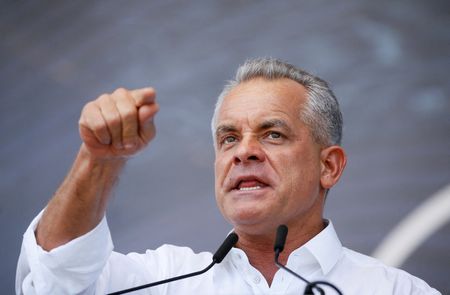By Lili Bayer
BRUSSELS (Reuters) -The European Union’s executive body recommended on Monday curbing Israeli access to its flagship research funding programme after calls from EU countries to increase pressure on Israel to alleviate the humanitarian crisis in Gaza.
Multiple EU countries said last week that Israel was not living up to its commitments under an agreement with the European Union on increasing aid supplies to Gaza and asked the European Commission to put concrete options on the table.
The proposal to partially suspend Israel’s participation in the Horizon Europe programme needs approval from a qualified majority of EU countries to take effect – at least 15 of the EU’s 27 members, representing at least 65% of its population.
The European Commission said in a statement that the proposal comes as a reaction to a review of Israel’s compliance with the human rights clause of an agreement governing its relations with the EU.
The bloc’s diplomatic service said in June that there were indications that Israel had breached its obligations under the terms of the pact.
“While Israel has announced a daily humanitarian pause in Gaza fighting and has met some of its commitments under the common understanding on humanitarian aid and access, the situation remains severe,” the Commission said on Monday.
The U.N.’s World Food Programme has said that almost 470,000 people in Gaza are enduring famine-like conditions, with 90,000 women and children in need of specialist nutrition treatments.
The Israeli government has rejected international criticism of its policies in the enclave.
Israel’s foreign ministry said in a post on social media platform X on Monday that the Commission’s move was “mistaken, regrettable, and unjustified” and that it hoped EU member countries would not adopt the proposal.
Israel has been participating in the EU’s research programs since 1996, taking part in thousands of joint projects over the past decades.
The Commission said the proposal would impact the participation of Israeli entities in the bloc’s European Innovation Council Accelerator “which targets start-ups and small businesses with disruptive innovations and emerging technologies that have potential dual-use applications, such as in cybersecurity, drones, and artificial intelligence”.
It did not say how much funding would be affected by the proposed freeze.
(Reporting by Lili Bayer and Andrew Gray; Editing by Makini Brice and Sharon Singleton)










